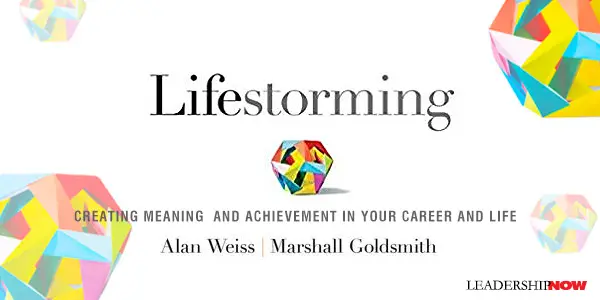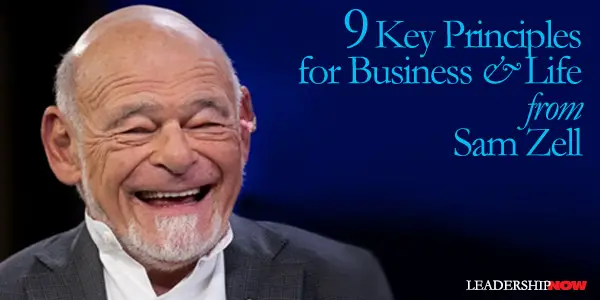 Leading Blog | Posts by Month |
 Leading Blog | Posts by Month |
05.31.17

LeadershipNow 140: May 2017 Compilation
See more on
Posted by Michael McKinney at 12:16 AM
05.26.17

Lifestorming: Creating the Life You Want
T Lifestorming: Creating Meaning and Achievement in Your Career and Life presents life as a journey without a “there.” An evolutionary journey through life. The goal for each of us is to take on life and enjoy it immensely by developing the required character and engaging in it enormously. As we go through life, “people skills are usually the key differentiators of success.” It is imperative that we work on ourselves. We begin by understanding where we are and then where we want to be. “The fundamental work of changing our behavior for the better is ultimately our own responsibility.” Going it alone is not easy and not the most effective way to implement major changes. We need a coach—or someone in our life that can act as a coach—because we need accountability and frankly, all too often, we don’t know what it is we really need to change. Replace Poor Behaviors When thinking about change, our strategy needs to be not to change poor behavior but to replace it. We cling to poor behaviors because we get something from it. Even in the midst of painful consequences, we can find some comfort in reproducing old ways of thinking. So, we need to find a positive, constructive behavior to replace the negative behavior that is currently generating the reward we seek without all of the collateral damage. “We often engage in behavior for no other reason than that we’ve never examined alternatives.” Challenge Your Beliefs If we can get to the beliefs behind our actions we can better regulate our behaviors. It’s important to remember too, that “we aren’t in a snapshot; we’re part of a film. We deal with what is today, knowing that it shouldn’t necessarily be what is tomorrow.” Beliefs form attitudes which in turn create behaviors. “Attitudes are the connectors—the synapses—between beliefs and behavior, a self-comforting way of thinking or feeling about someone or something, typically reflected in a person’s behavior.” Everything we do comes from how we look at life—our personal reality. Remaining Faithful to Your Growth Plan We need to create a support system and we are responsible for creating our own support system. As a journey, we need to understand that behavior is more important than victories. “If you engage in consistently correct behavior, you’ll be successful.” Seek excellence, not perfection. “Once you’re content with excellence, you’ll improve daily and will act daily with alacrity and intent.” And learn when to fold and when to hold. “There is a time when you cannot change things, they will not get better on their own, and you need to take a sharp right turn to escape your predicament.” They caution: “If we don’t accept the things we can’t change, we’ll forever be stressed and unhealthy.” A growth journey is not always easy and there will be obstacles. “Achieving success does not immediately or automatically make life easier. Instead, it usually creates new challenges—often ones we didn’t anticipate.” “We know that whatever fate delivers, we have some agency—even if it’s only in how we react.” We need to stay in control of ourselves and only take prudent risks. For example, don’t gamble with finances, time, health, or relationships. As we grow, a spirit of generosity will help us to keep from backsliding. A scarcity mindset weakens and limits us. We must expand our view. “We have to think differently and think bigger. Instead of extrapolating from where we are today and looking at arithmetic growth, we must paint a picture of the future and decide how to achieve it through geometric growth. Our journey is a moving target.” Lifestorming addresses the pitfalls of growth and the traps we fall into—like the need to be right. You will find a complete and effective plan to guide you on your own growth journey. The authors also share their own personal stories for encouragement. Lifestorming pack years of experience into one book.   
Posted by Michael McKinney at 10:25 AM
05.19.17

9 Key Principles for Business & Life from Sam Zell
B He doesn’t claim to be self-made. He credits his parents with handing down to him values that have served him well in life. He is the son of Jewish immigrants who fled Poland in 1939 to avoid the Holocaust. “My parents were very disciplined and very focused on work and achievement, and they led by example.” His parents “never dumbed down the conversation for the kids.” Lessons were taught through examples and stories. His parents provided Zell with a different perspective than his friends. They were given a bigger-picture orientation. As a result, he was “more comfortable standing apart” than he was trying to fit in. It was to be a defining characteristic of his life. “Conventional wisdom,” Zell writes, “is nothing more to me but a reference point.” But he notes, you can’t create your own playbook “unless you understand the rules of the game and play well within the lines. As long as you know where everyone else is, you can play the game.” Below are nine of Zell’s key philosophies for how he approaches business and life: 1. Be Ready to Pivot
2. Keep it Simple
3. Keep Your Eyes (and Mind) Wide Open
4. Be the Lead Dog
5. Do the Right Thing
6. Shem Tov – A Good Reputation
7. Prize Loyalty
8. Obey the Eleventh Commandment
9. Go All In
Zell advocates an owner/entrepreneurial mindset in business and life. “An owner is consumed with making the most out of what he already has. He’s all in. An entrepreneur is always looking for a new opportunity. He’s always reaching.” As he tells his grandkids, “Your responsibility is to maximize the skills you were given. But whatever you decide to do, invest everything you have in it—excel. What I’ve done is not the example I wanted to set; it’s the way I’ve done it that I hope you emulate, through focus, effort, and commitment.” 
Posted by Michael McKinney at 05:29 PM
05.11.17

Be a Spark!
T Sparks initiate action and create the conditions for success for themselves and others. Knowing the pathway to leadership development is a personal development job. In SPARK: How to Lead Yourself and Others to Greater Success, they offer seven essential behaviors that every leader needs to develop. None of us are born leaders. These behaviors are not innate and take time to develop. Character: By gaining awareness of what you truly value, you can think and act in ways that allow you to direct your life and have influence over others. Leading with your own values is the gateway to leading others. Credibility: Credibility is the foundation of your leadership style. It forms the basis of trust. If people can’t trust you, you can’t lead them. Accountability: Sparks resist the powerful, human instinct to place blame. They seek to identify how their own actions, or inactions, have contributed to the situations in which they find themselves in. Act with Intent: By having a clear vision and making choices consistent with it, take actions that lead themselves — and others — towards it. Sparks differentiate themselves by having the discipline and the fortitude to execute, even when they aren’t sure what to do next. Be of Service: Sparks are always aware of others’ needs and take action to meet them. This outward focus strengthens relationships and creates camaraderie and connection. When people feel cared for because you’re serving them, they begin to feel safe and experience your commitment to them. They focus less on themselves and more on the team. Confidence: Your confidence level will determine the level of results you experience. Sparks don’t leave their confidence to chance. They consciously manage their internal thought process to achieve a level of steadiness as their sense of confidence rises. We can control our confidence. Consistency: Sparks set a high standard for consistency in their everyday work. To achieve it, they first need to understand the value of readiness, know what perseverance really means, and have the courage to “own” their time. Consistency is about being a “sometimes person” or an “always person.” A chapter is devoted to each of these seven behaviors and conclude with practical suggestions on how to develop these qualities not only within yourself, but how to inspires others to begin their own Spark journey. 
Posted by Michael McKinney at 05:26 PM
05.01.17

First Look: Leadership Books for May 2017Here's a look at some of the best leadership books to be released in May.    
For bulk orders call 1-800-423-8273
 Build your leadership library with these specials on over 39 titles. All titles are at least 40% off the list price and are available only in limited quantities. "Life-transforming ideas have always come to me through books.” — Bell Hooks
Posted by Michael McKinney at 07:58 AM
|
BUILD YOUR KNOWLEDGE


How to Do Your Start-Up Right STRAIGHT TALK FOR START-UPS 
Grow Your Leadership Skills NEW AND UPCOMING LEADERSHIP BOOKS 
Leadership Minute BITE-SIZE CONCEPTS YOU CAN CHEW ON 
Classic Leadership Books BOOKS TO READ BEFORE YOU LEAD |
|